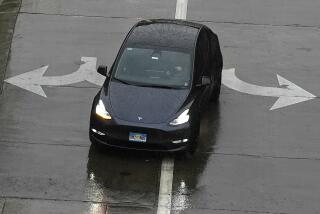Volkswagen, Audi sales increase despite emissions cheating scandal

New Volkswagens are ready to be shipped at the VW factory in Emden, Germany, on Sept. 30, 2015.
September auto sales were so strong in the U.S. that even Volkswagen squeezed out a gain — despite halting all sales of its diesel cars because of an emissions test-rigging scandal.
Volkswagen’s U.S. division said it sold 26,141 vehicles in September, up 145 cars from what it sold in September 2014.
Volkswagen’s Audi brand — which has just one model, the A3, caught up in the cheating scandal — was mostly unaffected. Audi reported that domestic sales in September increased 16.2% to 17,340 vehicles.
“Volkswagen’s deception is dominating headlines, but it is not keeping shoppers away from other brands’ showrooms,” said Jessica Caldwell, an analyst at auto information company Edmunds.com.
Automakers sold more than 1.4 million vehicles in the U.S. in September, a 15.8% gain from a year earlier, according to Autodata Corp., an industry research firm. General Motors, Ford, Chrysler, Toyota and Nissan all posted double-digit increases.
“It is an incredibly robust market,” said Beth Ann Bovino, senior economist at Standard & Poor’s corporate credit rating agency. “Considering there are still so many older vehicles on the road, the market might not be tapped out.”
Auto shopping company TrueCar believes automakers will sell 17.4 million vehicles in the U.S. this year, which, depending on the exact number, could break the industry’s record sales of the same amount in 2000.
Although VW squeezed out a small sales gain last month, there are other signs of erosion. VW brand sales are down almost 20% from August.
The average sales price of Volkswagen-built cars — including the upscale Audi and Porsche brands — fell almost 2% from August to September to $39,008, according to a review of transaction data by Kelley Blue Book.
Prices for used VW brand cars also are sliding. Gas models slipped 4% and diesels dropped 21% in the last two weeks, according to Kelley Blue Book.
The rest of the industry is booming, however, in part on the strength of new products, especially crossovers and small sport utility vehicles, and advanced technology, said Akshay Anand, an analyst for Kelley Blue Book.
“Cars continue to get safer and smarter, with hosts of new features every single year,” Anand said.
Many economic factors point to continued strength in auto sales, Bovino said.
The economy has gained 250,000 jobs a month for the last year.
“We also have seen younger buyers coming into the market,” Bovino said. “They weren’t there during the recession and weaker part of the recovery.”
Consumers ages 20 to 37 now account for about 27% of total car sales, up from 18% in 2010.
Construction trades, an important source of truck purchases, also are contributing to the auto sales boom, Bovino said, noting that housing starts reached 1 million in 10 of the last 12 months and U.S. construction spending rose 0.7% in August.
Ford’s F-series pickup truck sales rose nearly 17% last month. GM’s truck sales, including its full and medium-size pickups, rose 18%.
Low gas prices also are fueling auto sales, said Mark Wakefield, head of the automotive practice at consulting firm AlixPartners.
“As they stay low longer people buy new vehicles or buy bigger vehicles,” Wakefield said.
Prices are falling even in California, which has some of the most expensive gasoline in the nation. The state average stood at $2.96 a gallon for regular gasoline Thursday, according to the Automobile Club of Southern California, 6.1 cents less than last week.
General Motors’ September sales rose 12.5% to 251,310 vehicles, compared with the same month last year, Autodata said.
Ford had a bigger gain. The automaker said its monthly sales jumped 23.3% to 221,269 vehicles.
Fiat Chrysler Automobiles watched sales rise 13.6% to 193,019 vehicles. It was the company’s best September since 2000.
Toyota had September U.S. sales of 194,399 vehicles, a 16.2% increase.
Honda sales rose 13.1% to 133,750 vehicles last month, a September U.S. sales record for the Japanese company.
Nissan posted sales of 121,782 vehicles, an 18.3% gain and also a September record.
Automakers are optimistic sales will continue to grow.
“The economy still has room to grow, and so do auto sales,” said Mustafa Mohatarem, GM’s chief economist.
Volkswagen, however, might not do as well in future months, analysts said.
“The automaker has a rough road ahead, not only through 2015 but into 2016 as well,” Anand said.
Federal and California regulators announced two weeks ago that VW had installed emissions test-evading software on cars with VW’s 2-liter, four-cylinder diesel engines.
The software detects when the vehicles are undergoing laboratory emissions tests and changes how they perform to make it appear as if they meet pollution requirements.
In normal driving, the vehicles emit as much as 40 times the allowable amount of smog-forming nitrogen oxide.
The scandal forced the company to stop selling VW and Audi brand cars equipped with the diesel engines and sparked investigations on both sides of the Atlantic and triggered the sudden resignation of its chief executive.
The company has taken a hit in consumer perception, according to a report from AutoPacific, an industry research firm.
AutoPacific surveyed 500 vehicle owners and found that 64% said they do not trust Volkswagen.
“How Volkswagen handles this issue is critical. Trust is an important issue with consumers, and every brand works hard to maintain that trust,” said Dan Hall, vice president at AutoPacific.
The survey also found significant suspicion of
the auto industry, with 64% of the respondents saying that they think other
manufacturers are, or may be, using test-defeating devices on their diesel vehicles and 55% suspicious that gasoline vehicles are similarly affected.
“These figures point to the overall skepticism of consumers with manufacturers,” Hall said.
Other automakers are down on Volkswagen too.
“This one company’s deeds have damaged trust in the auto industry,” Fumihiko Ike, head of the Japan Automobile Manufacturers Assn. and chairman of Honda Motor Co., told reporters Thursday in Tokyo.
Twitter: @latimesjerry







